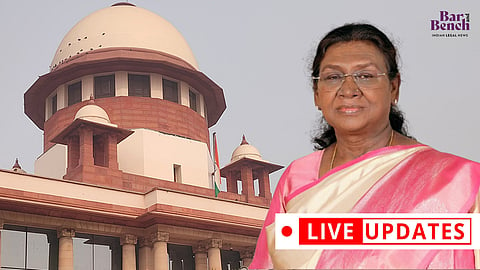- Latest Legal News
- News
- Dealstreet
- Viewpoint
- Columns
- Interviews
- Law School
- Legal Jobs
- हिंदी
- ಕನ್ನಡ

The Supreme Court is hearing the Presidential reference case on timelines and procedures for the President and State Governors when considering Bills passed by State legislatures.
A Constitution Bench comprising Chief Justice of India (CJI) BR Gavai, Justice Surya Kant, Justice Vikram Nath, Justice PS Narasimha and Justice Atul S Chandurkar is hearing the matter.
The Bench was constituted to decide the reference made by President Droupadi Murmu under Article 143(1) of the Constitution, which allows the President to seek the Court’s opinion on questions of law or matters of public importance.
The Presidential reference challenges the top court’s top court's April ruling which prescribed timelines for the President and the Governor to decide on Bills and also held that the Governor’s inaction under Article 200 (Governor's powers regarding assent to bills passed by the State Legislature) was subject to judicial review.
The reference was triggered by the Supreme Court’s judgment of April 8 in a case filed by the State of Tamil Nadu against the Governor.
In the judgment, the apex court ruled that the absence of a time limit under Article 200 to decide on bills passed by the State legislature could not be interpreted to allow indefinite delay.
A Bench of Justices JB Pardiwala and R Mahadevan held that the Governor must act within a reasonable time and that constitutional silence could not be used to stall the democratic process.
The Court held that although Article 200 does not specify any time limit, it cannot be interpreted to allow indefinite delay by the Governor in acting on Bills passed by the State legislature.
With regard to the President’s powers under Article 201, the Court held that her decision-making is not beyond judicial scrutiny and must occur within three months. If there is any delay beyond that period, reasons must be recorded and communicated to the concerned State.
“The President is required to take a decision on the Bills within a period of three months from the date on which such reference is received and in case of any delay beyond this period, appropriate reasons would have to be recorded and conveyed to the concerned State,” the judgment said.
Following the ruling, President Murmu referred fourteen questions to the Supreme Court, raising constitutional concerns about the Court’s interpretation of Articles 200 and 201. The reference argued that neither Article contains any express provision empowering the Court to prescribe deadlines, and that the notion of “deemed assent” in the event of delay is not contemplated by the Constitution.
The reference objected to the Supreme Court’s ruling that introduced the concept of “deemed assent” if the President or Governor failed to act on a Bill within a prescribed time. The reference argued that such a concept was contrary to the constitutional framework.
The President’s questions are understood to include whether the Supreme Court can effectively legislate a procedure where the Constitution is silent, and whether timelines for assent encroach upon the discretionary domain of constitutional functionaries.
The reference also underscored that legislative functions are separate from judicial powers, and that directions of the kind issued in the Tamil Nadu Governor's judgment risk upsetting the balance between the three branches of government.
Both Kerala and Tamil Nadu have opposed the reference as not maintainable.
According to TN's application, the reference is an appeal in the disguise of a reference and it should be returned by the Court unanswered since the Supreme Court cannot sit in appeal over its judgments.
The State of Kerala too filed an application before the Supreme Court to declare the Presidential reference as not maintainable.
On the other hand, the Central government has supported the reference, arguing that the power of Governors and the President to act on Bills is a “high prerogative” function which cannot be bound by judicial timelines.
Pertinently, the Centre has also said that Governors are not mere emissaries or outsiders in a State but carry the will of the people of the entire country into individual States.
During the hearing of the matter on Wednesday, the Supreme Court observed that if a Governor is given the power to permanently withhold assent to the bills passed by State legislature, it would leave the elected State government at the whims and fancies of an unelected Governor.